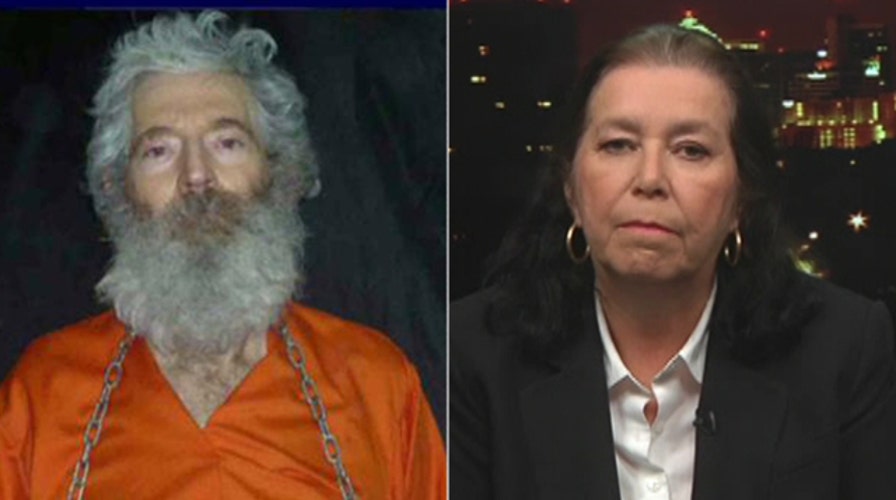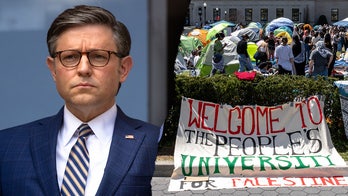Is Iran behind photos of missing ex-FBI agent?
Washington officials now suspect Iranian government is behind 2-year-old images of Robert Levinson and his family wants help
The wife of a missing retired FBI agent is calling on the U.S. government to put more pressure on Iran to send her husband home, as she releases photos that she received two years ago of her husband as a hostage.
Robert Levinson, a private investigator, disappeared in 2007 on the Iranian island of Kish. The Iranian government has repeatedly denied knowing anything about his disappearance, and the disturbing video and photos that Levinson's family received in late 2010 and early 2011 seemed to give credence to the idea.
U.S. officials now see the government of Iran behind the images and video, intelligence officials told The Associated Press, and Levinson's wife, Christine Levinson, wants the world to know she hasn't given up hope of seeing him again.
"I believe he is still alive," she said in an interview Tuesday night with Fox News' Greta Van Susteren. "I believe he is spending every waking hour making sure that he is well enough to come home to us."
Their oldest daughter is getting married in a month, Levinson said. U.S. officials have told her they are doing everything they can, but investigators haven't been able to find much information about him.
The extraordinary photos -- showing Levinson's hair wild and gray, his beard long and unkempt -- are being seen for the first time publicly after the family provided copies first to the AP. The video has been previously released.
"I feel that there needs to be more attention to the case, and that is why I am putting the pictures out," Christine Levinson told Fox News.
In response to Iran's repeated denials, and amid secret conversations with Iran's government, Secretary of State Hillary Clinton said in a statement in March 2011 that Levinson was being held somewhere in South Asia. The implication was that Levinson might be in the hands of terrorist group or criminal organization somewhere in Pakistan or Afghanistan.
The statement was a goodwill gesture to Iran, one that the U.S. hoped would prod Tehran to help bring him home.
But nothing happened.
Two years later, with the investigation stalled, the consensus now among some U.S. officials involved in the case is that despite years of denials, Iran's intelligence service was almost certainly behind the 54-second video and five photographs of Levinson that were emailed anonymously to his family. The tradecraft used to send those items was too good, indicating professional spies were behind them, the officials said, speaking on the condition of anonymity because they weren't authorized to talk publicly. While everything dealing with Iran is murky, their conclusion is based on the U.S. government's best intelligence analysis.
The photos, for example, portray Levinson in an orange jumpsuit like those worn by detainees at the U.S. prison at Guantanamo Bay. The family received them via email in April 2011. In each photo, he held a sign bearing a different message.
"I am here in Guantanamo," one said. "Do you know where it is?"
Another read: "This is the result of 30 years serving for USA."
Iranian President Mahmoud Ahmadinejad has personally and repeatedly criticized the U.S. over its detention facility at Guantanamo Bay.
U.S. operatives in Afghanistan managed to trace the cellphone used to send the photographs, officials said. But the owner had nothing to do with the photos, and the trail went cold.
It was that way, too, with the hostage video the family received. It was sent from a cyber cafe in Pakistan in November 2010. The video depicted a haggard Levinson, who said he was being held by a "group." In the background, Pashtun wedding music can be heard. The Pashtun people live primarily in Pakistan and Afghanistan, just across Iran's eastern border.
Yet the sender left no clues to his identity and never used that email address again.
Whoever was behind the photos and video was no amateur, U.S. authorities concluded. They made no mistakes, leading investigators to conclude it had to be a professional intelligence service like Iran's Ministry of Intelligence and Security.
Though U.S. diplomats and the FBI have tried behind the scenes to find Levinson, of Coral Springs, Fla., and bring him home, both presidents George W. Bush and Barack Obama have said little about his case and have applied little public pressure on Iran for more information about Levinson's whereabouts.
Christine Levinson has watched more public pressure result in Iran's release of a trio of hikers, a journalist named Roxana Saberi and a team of British sailors captured by the Iranian Navy. Everyone has come home except her husband.
Washington's quiet diplomacy, meanwhile, has yielded scant results beyond the Iranian president's promise to help find Levinson.
In one meeting between the two countries, the Iranians told the U.S. that they were looking for Levinson and were conducting raids in Baluchistan, a mountainous region that includes parts of Pakistan, Iran and Afghanistan, U.S. officials said. But the U.S. ultimately concluded that the Iranians made up the story. There were no raids, and officials determined that the episode was a ruse by Iranian counterintelligence to learn how U.S. intelligence agencies work.
An expert on Russian organized crime, Levinson retired from the FBI in 1998 and became a private investigator. He was investigating cigarette smuggling in early 2007, and his family has said that took him to the Iranian island of Kish, where he was last seen. Kish is a popular resort area and a hotbed of smuggling and organized crime. It is also a free trade zone, meaning U.S. citizens do not need visas to travel there.
FBI spokeswoman Jacqueline Maguire said: "As we near the sixth anniversary of his disappearance, the FBI remains committed to bringing Bob home safely to his family."
Christine Levinson said she has met with Obama and John Brennan, Obama's counterterrorism czar and nominee to run the CIA. She said that both men pledged to do everything they could to free her husband. Now, nearly six years after his disappearance, she thinks Iran is being let off the hook.
"He's a good man," she told the Associated Press. "He just doesn't deserve this."
The Associated Press contributed to this report.





